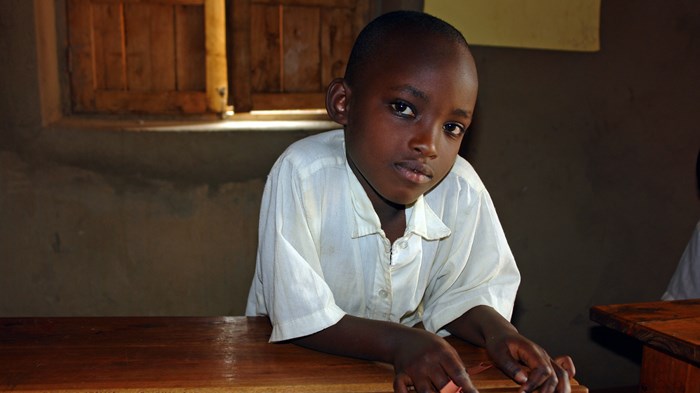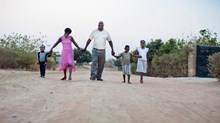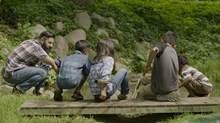This Simple Solution to the Orphan Crisis Is Not What You Would Expect

There is a myth preventing tens of millions of children and families from thriving.
The myth is this: children in orphanages don’t have parents. Many have accepted this myth as fact and, as a result, jump to support orphanages and children’s homes. In fact, U.S. Christians give an estimated $2.5 billion to this type of “orphan” care each year.
As long as this myth remains, efforts to help vulnerable children globally will fall short of finding the real answer to the problems these children face. The reality is 80 percent of children in orphanages and other forms of residential care have at least one living parent, and almost all have other relatives who could care for them.
What keeps them apart aren’t intangible things, like love and connectedness. What keeps them apart are tangible needs that families feel they are unable to provide—and the hope that those will be provided if their child is cared for elsewhere. Often, poverty is the kiss of death for family togetherness, as parents send their children to orphanages where they believe they will have access to food, clean water, housing, and schooling.
The problem of course is that tangible items—no matter how good they are—cannot take the place of a family. I know this from experience.
Growing up in Sierra Leone, I had a hard but full life. My parents were subsistence farmers who worked hard yet didn’t have the means to send me to school. Our family was poor, but full of love. But when I was 7 years old, rebels came. When war came to my village, I lost my father, and I was separated from my mother.
For nearly a year, I lived on the streets of a nearby town until workers from an orphanage came to help me. It was one of the most highly respected orphanages in the entire country. They gave me a safe place to live when I didn’t have one. I was well-cared for and with their support was even able to attend college. Yet, I thought of my mother often—I missed her and my father so much. I missed their reassuring presence and their endless love.
The trauma I experienced being separated from my family is similar to what millions of children in residential care have also experienced. I did not know my mother was alive, but many children do know they have family, and they desire nothing more than to be reunited with their loved ones. The physical, emotional, and mental toll orphanages take on children into adulthood is well-documented—and equally devastating. These include, but are not limited to, attachment and trust issues, mental health struggles, and increases in criminal activity, the risk of being trafficked, and suicide rates. Many children are also subject to an increased risk of neglect and physical, sexual, or emotional abuse.
For those who have a desire to help vulnerable children, my sincere hope is that stories like mine will point them to a better solution than supporting orphanages and children’s homes.
Occam’s Razor Related to Orphan Care
Occam’s Razor is a principle originally used in the scientific community that suggests the simplest solution is almost always the best. In pursuit of a simple solution to the orphan crisis, well-meaning individuals, churches, and organizations build orphanages. They work hard to provide the very best residential care possible for orphaned and vulnerable children. But what we really need is something radically different—and even simpler: family. The orphan crisis can only be solved when we center on strengthening families and safely reunifying children with their families as the solution.
Note: “Simpler” here doesn’t mean easier. Overcoming the barriers of poverty and the lack of opportunities that many families face takes creativity and collaboration as we work together towards success. Thankfully, many organizations, including my own, are now committed to getting children back into families, whether their own or local foster and adoptive families, as the only real way to provide a healthier and happier tomorrow for children who have been separated from their loved ones.
At the age of 19, ten years after I entered the orphanage, I was reunited with my mother. From the day the rebels attacked, she had been moving from one refugee camp to another and dealing with lingering medical issues that resulted from the torture she had endured. I cannot explain what that moment meant to both of us when we first met. She fainted; I was overjoyed.
Later, I became the director of the same orphanage I grew up in and began reflecting on my own experience. With the help of our staff and donors, we started shifting our work as a residential care facility to reintegrating children with their families. Now we strengthen and empower families and communities so parents never have to make that difficult decision to place their children in an orphanage.
Discovering the true simplest answer to the orphan crisis begins with debunking the orphan myth—that these children do not have living parents or family members. Once it’s globally recognized that we can solve the so-called orphan crisis by investing in families, providing resources, and caring for and strengthening those in poverty, we can move towards raising a generation of children who will thrive into adulthood. Having both their tangible and intangible needs met in a family, these children really will have a better tomorrow.
Emmanuel Mohamed Nabieu is Director for Mission Advancement and Partnership at Helping Children Worldwide.
The Better Samaritan is a part of CT's
Blog Forum. Support the work of CT.
Subscribe and get one year free.
The views of the blogger do not necessarily reflect those of Christianity Today.





















